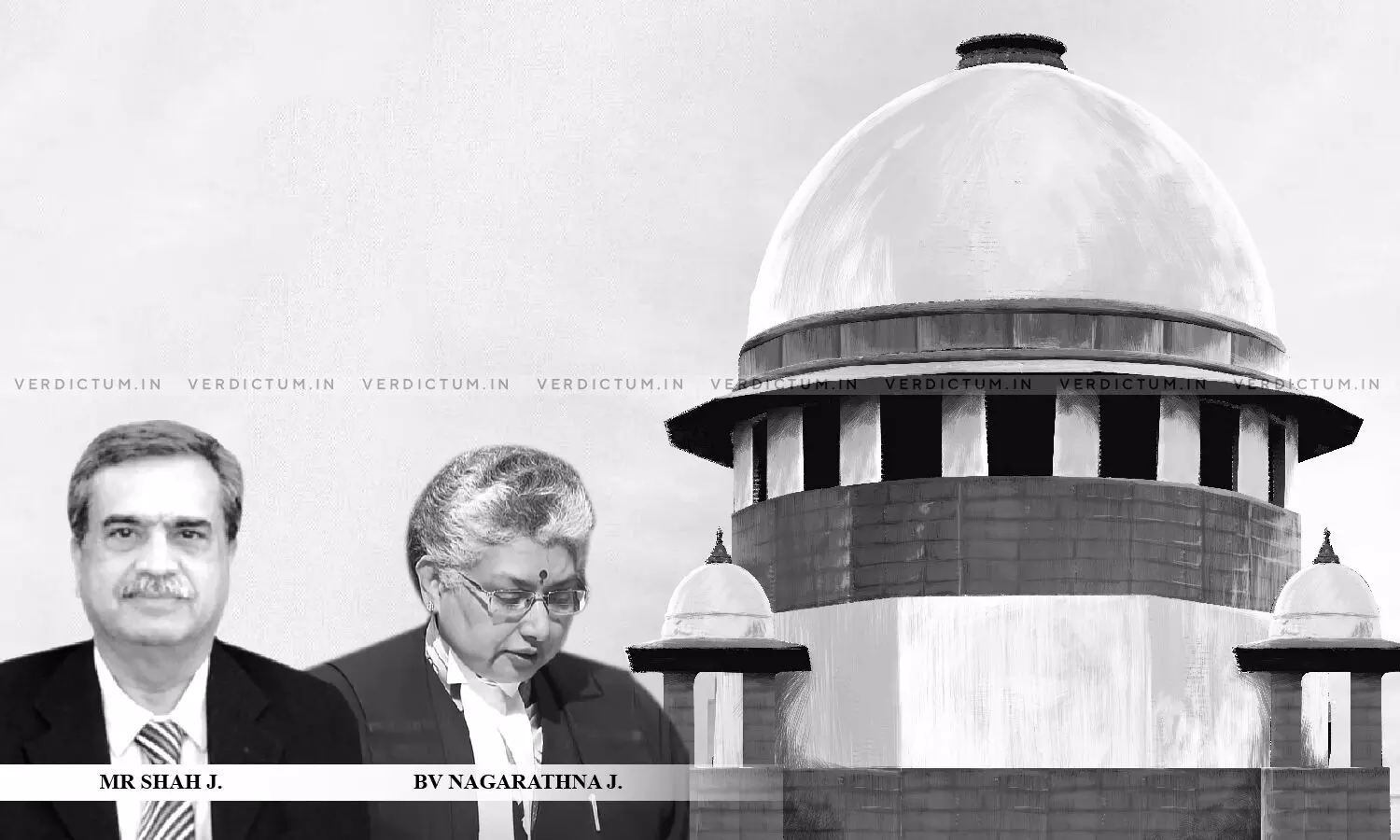
SC Bench Issues Split Verdict In Suit For Specific Performance Where Sale Agreement Wasn't Given Effect Within Time Stipulated
 |
|A Supreme Court Bench of Justice MR Shah and Justice BV Nagarathna heard a matter pertaining to the specific performance of a contract, where the agreement of sale had not been given effect within the time stipulated. The Bench issued a split verdict. Justice MR Shah allowed the appeal, while Justice BV Nagarathna dismissed it.
Counsel MKS Menon appeared for the plaintiff, and Counsel Raghenth Basant appeared for the original defendants.
Facts:
In this case, the plaintiff and defendants had entered into an agreement to sell, and the plaintiff paid an advance towards the part sale consideration amount. The balance consideration was agreed to be paid by the plaintiff within six months, provided the defendants make available the documents of title, including the purchase certificate under the Kerala Land Reforms Act.
Thereafter, the plaintiff served a legal notice upon the defendants to execute the sale deed to which the defendants sent a reply and refused to execute the sale deed and canceled the agreement to sell. Subsequently, the plaintiff instituted a suit for the specific performance of the agreement to sell and in the alternative return the plaintiff’s amount with interest.
The Trial Court passed a decree for specific performance, which was set aside by the High Court.
Justice MR Shah's Judgment:
Justice MR Shah observed that "it was never the case on behalf of the defendants in the written statement and/or even before the learned trial Court that the agreement to sell was inequitable and/or was a forced agreement to sell." He noted that the High Court had not commented upon and/or set aside any of the findings recorded by the Trial Court while passing a decree for specific performance. In that context, it was said that "The High Court has erred in interfering with the judgment and decree passed by the learned trial Court, without setting aside the findings recorded by the learned trial Court recorded while passing the decree for specific performance. The impugned judgment and order passed by the High Court is unsustainable, both, on law as well as on facts."
Consequently, he allowed the appeal. In the exercise of powers under Article 142 of the Indian Constitution, he directed that a further amount of Rs. 10,00,000/- over and above the sale consideration mentioned in the agreement to sell, and the amount already deposited must be paid within a period of six weeks. It was also ordered that the amount which might have been deposited based on the order of the High Court must also be paid back.
No orders were passed regarding costs.
Justice BV Nagarathna's Judgment:
Justice BV Nagarathna analysed a catena of judgments and the applicable provisions of law of the Specific Relief Act to observe that "even in the absence of discretionary power under Section 20 to deny the relief of specific performance, the plaintiff was not entitled to claim such relief as a matter of right. The position of law, even following the amendment of 2018 remains that the provisions of Section 16 of the Act have to be mandatorily complied with by the party seeking the relief of specific performance."
Analyzing factors that ought to guide the Court's decision in decreeing a suit for specific performance, particularly when the agreement of sale has not been given effect to within the time stipulated, she relied on the decision given in K.S. Vidyanadam vs. Vairavan. In the judgment, it was reiterated that when the parties prescribe a time/period, for taking certain steps or for completion of the transaction, that must have some significance and therefore time/period prescribed cannot be ignored. It was also stressed that the courts will apply greater scrutiny and strictness when considering whether the purchaser was "ready and willing" to perform his part of the contract.
In light of the same, she noted that "the period of six months which was stipulated in the agreement of sale of Kanam and Kuzhikoor rights, in the present case, has to be accorded its due significance while deciding the suit for specific performance". She further held that "the plaintiff, having paid no more than 4% of the sale consideration, and having not done even as much as getting the property measured within the period of six months stipulated under the agreement, cannot, at a belated date, claim specific performance of the agreement dated 7th August, 2005 to the disadvantage and hardship of the defendants."
With regard to the award of an additional amount of consideration to the seller at the discretion of the Court, she observed that "While I am mindful of the fact that Courts may grant such a relief to balance equities, such a decree would be warranted only in cases where the plaintiff satisfactorily establishes compliance with Section 16 of the Act." and that "In the absence of compliance with the elementary requirements of Section 16 of the Act, enhancement of compensation cannot be employed as a device to allow specific performance in cases where the plaintiff has not performed his obligations under the contract as in the instant case."
Subsequently, she held that "this appeal must fail on the sole ground that the conduct of the plaintiff was not reflective of his readiness as well as willingness on his part to pursue the agreement of sale of Kanam and Kuzhikoor rights, in terms of Section 16(c) of the Act. Accordingly, the present appeal is dismissed."
Parties were directed to bear their respective costs.
Cause Title: C. Haridasan v. Anappath Parakkattu Vasudeva Kurup & Others
Click here to read/download the Judgment